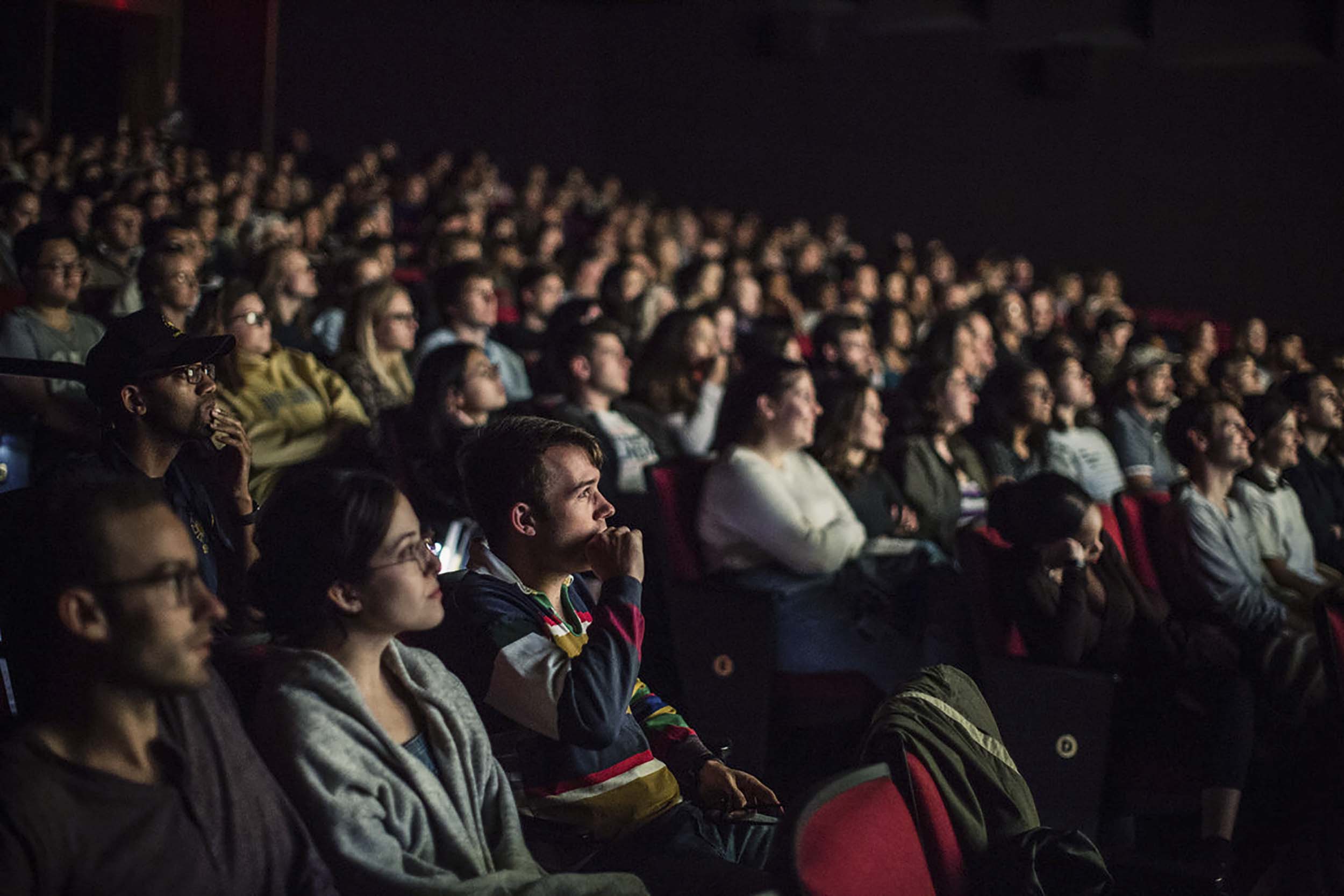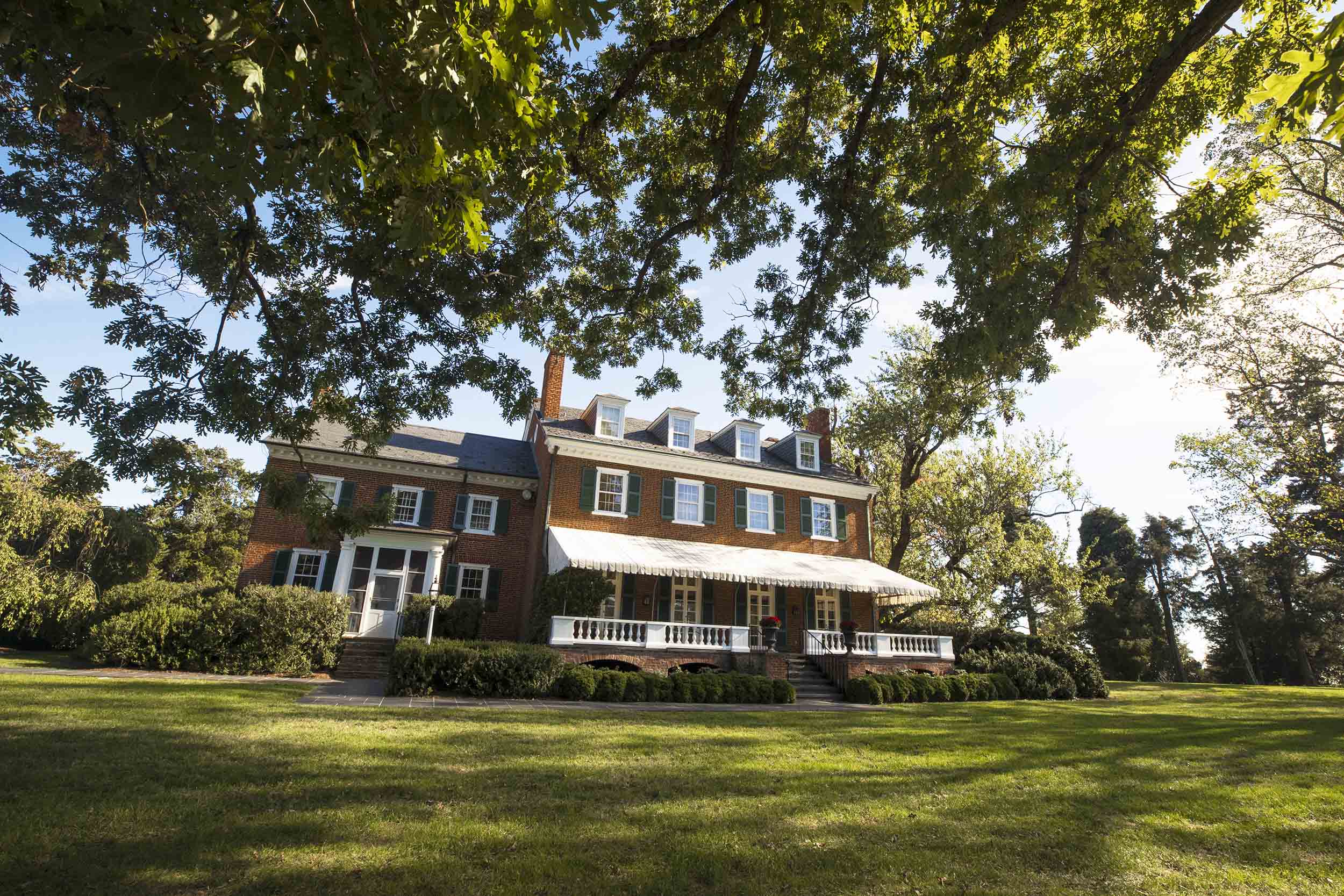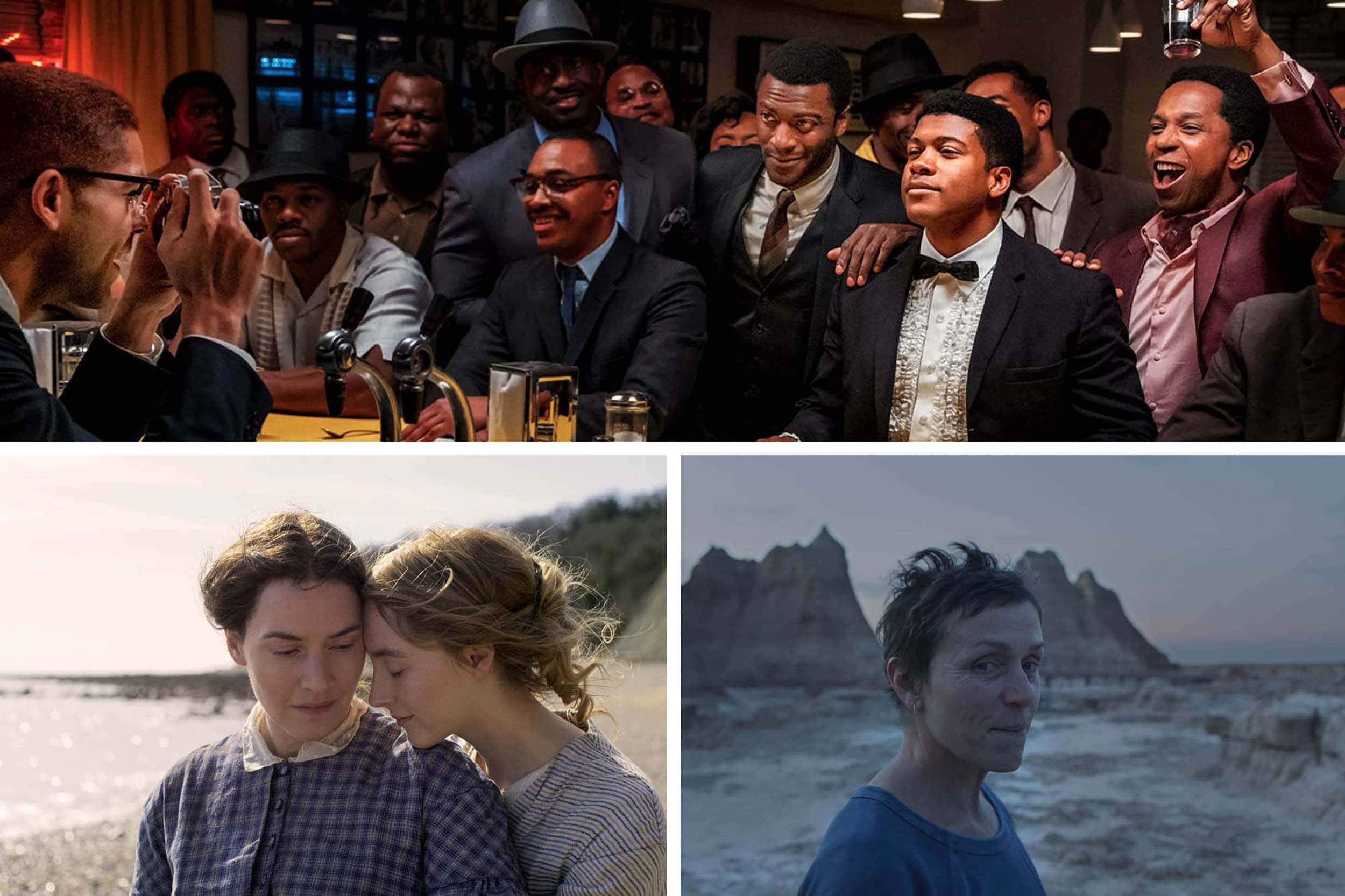For 33 years, the Virginia Film Festival has drawn throngs of filmmakers and moviegoers to Charlottesville and the University of Virginia, where they happily meet, mingle, fill theater seats and queue up for jam-packed days of discussions and live events.
But this is 2020, the year of the coronavirus pandemic, and, sadly, throngs of people pose a serious safety concern. For the festival – a program of the University – business as usual was not an option. Like UVA and like so many other organizations, the festival’s organizers had to adapt.
“Back in mid-March, when the University suspended in-person classes, we all hoped the pandemic was a short-term circumstance, something that would start to slow down over the summer,” festival director and UVA Vice Provost for the Arts Jody Kielbasa said. “But as the spring went on, it became increasingly clear that hosting large public events this fall would not be feasible.”
Accordingly, Kielbasa and his team began to craft one of the biggest plot twists in festival history: they were going virtual.
“The festival is something that the community looks forward to every year, and we didn’t want to lose that, even, or especially, this year,” said Kielbasa, noting that both his staff and the festival’s advisory board – a 28-member board of film industry veterans chaired by UVA alum and producer Mark Johnson of “Breaking Bad” and “Better Call Saul” fame – were fully supportive of the move.
“In film, we are fortunate that we can still present art virtually, in a way that many other artists cannot,” he said. “So, we knew we needed to shift our thinking.”
Six months after beginning those initial conversations, Kielbasa and his team are ready to put on a virtual festival this week, beginning Wednesday and running through Sunday. It will feature more than 70 films offered online, along with discussions with actors, filmmakers and UVA faculty members, and – in a creative move – 10 drive-in movie screenings.

There will be Oscar contenders, like “Ammonite,” starring Kate Winslet as 19th-century paleontologist Mary Anning, and “Nomadland,” about a modern-day nomad after an economic collapse; a wide range of independent films; and a star-studded guest list, including Annette Bening, Leslie Odom Jr., Ethan Hawke, photographer Pete Souza, “Breaking Bad” and “Better Call Saul” creator Vince Gilligan and many more. (Find a full schedule and ticketing information.)
And, for Kielbasa and his staff, there will be both nerves and excitement as the festival they love takes on a new form in a different and difficult year. As they wrapped up final preparations, they took some time to discuss how it all happened.
Research and Test Drives
“Once we made the decision to go virtual, I felt relief, in some ways,” Jenny Mays, the festival’s managing director, said. “The time leading up to that decision was really tough, because no one knew how the pandemic would go, but once we knew we needed to go virtual, we could roll up our sleeves and get going.”
Normally, Mays pointed out, festival staff would be booking venues, hiring part-time staff and coordinating guests by the spring. Instead, this spring, they started hosting small virtual events to test the technology and build their skills, and attended spring and summer virtual festivals to see how other organizers were adapting.
“We were encouraged to see other festivals making the shift, and it gave us the luxury to see what worked and what didn’t,” Kielbasa said.
Kielbasa also took his family to a local drive-in theater in Goochland, something he had not done for years. As he sat in his car, watching the movie through his windshield, the ideas began to flow
“It was a great experience, well-run and socially distant,” he said. “I just kept thinking about how great it would be to have some in-person component to our festival, even if most of it is online.”
The Dairy Market, a new food hall and event space on Grady Avenue in Charlottesville, had already expressed interest in partnering with the festival, and Kielbasa also knew that Morven Farm, a 2,913-acre Albemarle County property owned by the UVA Foundation, was eager to find safe ways to host events.
Soon, both venues had agreed to host nightly drive-in movies during the festival, with participants safely spaced apart in their cars. The venues will host two screenings each night from Wednesday through Sunday, one at 7:30 p.m. at Morven and one at 8 p.m. at the Dairy Market. (Ticket information is available here; some screenings are sold out.)
“The drive-in movies give us some way to bring communities together for something of a shared experience, in beautiful settings, either at this great new Charlottesville venue or framed by the Blue Ridge Mountains at Morven,” Kielbasa said. “The response has been great, and I’m really looking forward to it.”
A Question of Rights
As the drive-in events came together, program manager Chandler Ferrebee and operations manager Rob Dunnenberger were focused on choosing films and finding the best way to present them.
Ferrebee knew early on that she was facing a unique challenge. When the pandemic hit, many filmmakers, especially those overseeing big, Oscar-contender films with a lot of money sunk into them, were determined to hold their films until they could be released in a theater, with a full audience.
Consequently, the festivals that normally screen those films were left wondering what they could show. The Toronto International Film Festival, which Kielbasa and his team looked to as an earlier example, normally screens more than 350 films, including about 30 to 40 high-profile Oscar contenders. This year, Kielbasa said, the September festival had about seven or eight such films.
“At first, it seemed like every filmmaker I reached out to was withholding their film,” Ferrebee recalled.

Festival staff also had to navigate rights questions – a film might be cleared for release in Virginia, for example, but not in California. With an in-person festival, that would not be an issue. But with a virtual festival, where attendees could be anywhere, rights questions got a little bit trickier. As such, a limited number of films in the Virginia Film Festival will only be available to audiences in certain locations, or for a certain number of views.
“That has been a new hurdle, and one that we have not faced before, as our [normal] audience is either in the seat at the Paramount Theater or they are not,” Kielbasa said.
The team was thrilled to land “One Night in Miami,” the feature directorial debut of actor Regina King, starring Leslie Odom Jr., as the opening night film; “Ammonite,” starring Kate Winlset and Saoirse Ronan; and “Nomadland,” provided high-profile centerpiece and closing night films. Advisory board members, including many UVA alumni who have forged careers in the film industry, also helped secure big films and guest stars.
“They truly rose to the occasion,” Kielbasa said.
From there, more and more films fell into place and, while they do not have quite as many films as they would in a normal year, when they screen about 150 films, Ferrebee is thrilled with the more than 70 films on offer.
“I love this program, and I would be proud to present it any year,” she said. “I am so happy to have that drive-in element, with some of the star films our audience is used to, and to have the best-of-the-best in the independent film world right now.”
With the program lined up, staff had to figure out how to present it. Their research pointed them to a platform called Eventive, which allows viewers to purchase tickets for film viewing on their device.

“There are only a handful of platforms out there that are up and running and able to accommodate something like this, because it is so new, and there are so many restrictions in place from distributors,” Dunnenberger said. “We saw Eventive in action at other festivals, and liked the model.”
Most of the festival’s content, including films and discussion sessions, will be available for viewers to purchase through Eventive and watch at any time during the festival’s duration.
Organizers purposefully kept individual ticket prices low, even while the festival was operating on a significantly reduced budget. Individual events can be purchased for $8, and the virtual all-access pass is $65, significantly lower than the $100 to $200 such passes run at other festivals. Some virtual events are free, including the discussion with Odom, and grade school and college students are eligible for a discounted pass. UVA students could use their Arts Dollars to receive a free virtual student pass.
“We realized that there are a lot of people in our community who are in a world of hurt right now, and we wanted to make the festival as accessible and affordable as we could,” Kielbasa said.
A virtual screening of “Boys State” will also be available for teachers in Charlottesville and Albemarle County to use in their online classes, organized by Erica Barnes, the festival’s business manager and outreach coordinator. The prize-winning documentary looks at a high school civics mock government exercise in Texas, and highlights youth getting involved in politics. The screening will include an introduction by U.S. Sen. Tim Scott and a discussion with UVA Center for Politics Director Larry Sabato and former Virginia Gov. Terry McAuliffe.
Zoom Stars
Kielbasa and his team were also eager to retain the robust discussions that have become a signature of the Virginia Film Festival. Because the festival is so closely connected with the University, it typically provides opportunities for faculty members and students to mingle with filmmakers, and to talk about how their art fits into broader social questions, from politics to social justice, racial equity and much more.
“When I came here, I was stunned at how people would stay for an hourlong discussion after a film. They want to hear from the artists, they ask questions, they are intellectually curious,” Kielbasa said. “I think that comes with having a festival in a college town, and that hasn’t changed. One reason we decided to pre-record our discussion sessions was so that we could have as many as possible, and have these really robust conversations.”
Festival staff and guests recorded the discussions in the weeks leading up to the festival; Barnes estimated that staff recorded more than 45 discussion sessions in the last month, including many with UVA faculty as moderators or speakers. And, because the virtual festival eliminated the need for guests to travel to Charlottesville, audiences will have access to far-flung, high-profile guests who might not have been able to make the trip otherwise.
“The turnaround time, in many cases was much faster this year,” Ferrebee said. Most guests recorded their sessions on Zoom, which staff then uploaded to Eventive. “I think we coordinated the Leslie Odom Jr. discussion in about a week. Normally, with filming schedules and such, that would take a lot longer.”
“I’ve had so many calls with [composer and 15-time Academy Award nominee] Thomas Newman, it feels like we are old friends at this point,” she joked.
All of the staff said guest artists were eager and excited to participate in the new format, and saw it as a way to support the arts, and uplift audiences, in a difficult year.
“There are fewer film productions going on at the moment, and artists are eager to give back to the public in this really tough time,” Kielbasa said. “Many of our guests have told us that this is a way they can share their art, reach an audience and say ‘thank you,’ too.”
Festival staff, too, are grateful to have a tangible way to give back to the community.
“The public response has been so enthusiastic and encouraging, and it has been great to see people excited about our program,” Mays said. “I’m really proud of the size, scope, diversity and the wonderful films and guest artists we are able to offer.”
“I am also so proud of the small team that has worked so hard to put this on,” she said. “This year, we have had to reinvent everything. Everything was a conversation; everything was a question. I am so lucky to work alongside people who just roll up their sleeves, figure it out and get creative. The unique position we are in is not lost on us, as much of the arts community can do very little right now. We are so thankful to be able to do this, and to do something for our community, for filmmakers and for our audiences.”
Caroline Newman













